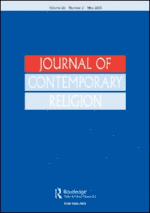Journal of Contemporary Religion
The Journal of Contemporary Religion is a triannual peer-reviewed academic journal which covers anthropological, sociological, psychological and philosophical aspects of religion.
 | |
| Discipline | Religious studies |
|---|---|
| Language | English |
| Edited by | Elisabeth Arweck |
| Publication details | |
Former name(s) | Religion Today |
| History | 1985-present |
| Publisher | |
| Frequency | Triannual |
| Standard abbreviations | |
| ISO 4 | J. Contemp. Relig. |
| Indexing | |
| ISSN | 1353-7903 (print) 1469-9419 (web) |
| Links | |
History and format
The journal was established in 1985 as Religion Today by the Centre for New Religions at King's College London. Its founding editor was Peter B. Clarke (later at Wolfson College, Oxford).[1][2][3] The journal, which changed its name to the current title in 1995,[3] is published by Routledge. Its current editor is Elisabeth Arweck (University of Warwick); Peter B. Clarke, who died in June 2011, remained listed as co-editor until the end of that year out of respect for his contributions to the field.[4][5][6]
An issue of the triannual journal typically features five or six major articles.[6] Other content includes conference reports, research notes, book reviews and review articles, and articles are sometimes illustrated with graphics or photographs.[6]
Reception
The Times Higher Education stated in a 1997 review of the journal that "The contributors are invariably academics, mainly from North America and Europe. The style ranges from the homely, almost chatty at times, to the more formal. The articles, however, are on the whole scholarly and, as advertised, treat of a wide range of subjects, from the Brahma Kumaris to Sahaja Yoga, from the 'Toronto Blessing' to the nature of fundamentalism, from 'The Protestant eruption into modern Brazilian politics' to 'Deconfessionalisation in the Netherlands' (in the last three decades or so). There are fieldwork reports, ethnographic accounts, and historical and conceptual studies. The standard of research and analysis is what one would expect from a good academic journal."[6] The review criticised the small number and seemingly arbitrary selection of book reviews, but concluded by stating that "On the whole, then, the journal is a valuable research tool and source of new knowledge for scholars, teachers and others interested in studying the phenomenon of contemporary religion. With nothing really comparable available in the field, it is highly recommended."[6]
Abstracting and indexing
The Journal of Contemporary Religion is abstracted and indexed in Applied Social Sciences Index & Abstracts, British Humanities Index, Worldwide Political Science Abstracts, EBSCOhost, Educational Research Abstracts Online, Multicultural Education Abstracts, New Testament Abstracts, Religious & Theological Abstracts, Sociological Abstracts, and Studies on Women and Gender Abstracts.[7]
References
- Arweck, Elisabeth. Researching new religious movements: responses and redefinitions, p. ix, Routledge 2006, ISBN 978-0-415-27755-6
- Stark, Rodney; Finke, Roger. Acts of faith: explaining the human side of religion. University of California Press 2000, p. 16, ISBN 978-0-520-22202-1
- Clarke, Peter Bernard. New Religions in Global Perspective: A Study of Religious Change in the Modern World, Routledge 2006, p. 46, ISBN 978-0-415-25748-0
- Arweck, Elisabeth (2011). "Peter B. Clarke (1940–2011)". Journal of Contemporary Religion. 26 (3): 353. doi:10.1080/13537903.2011.620796.
- Editorial Board, Taylor and Francis
- Lipner, Julius (1997-10-17). "Social science & humanities journals: Prayers for today", Times Higher Education. Retrieved 2010-06-19.
- "Journal of Contemporary Religion". tandfonline.com.